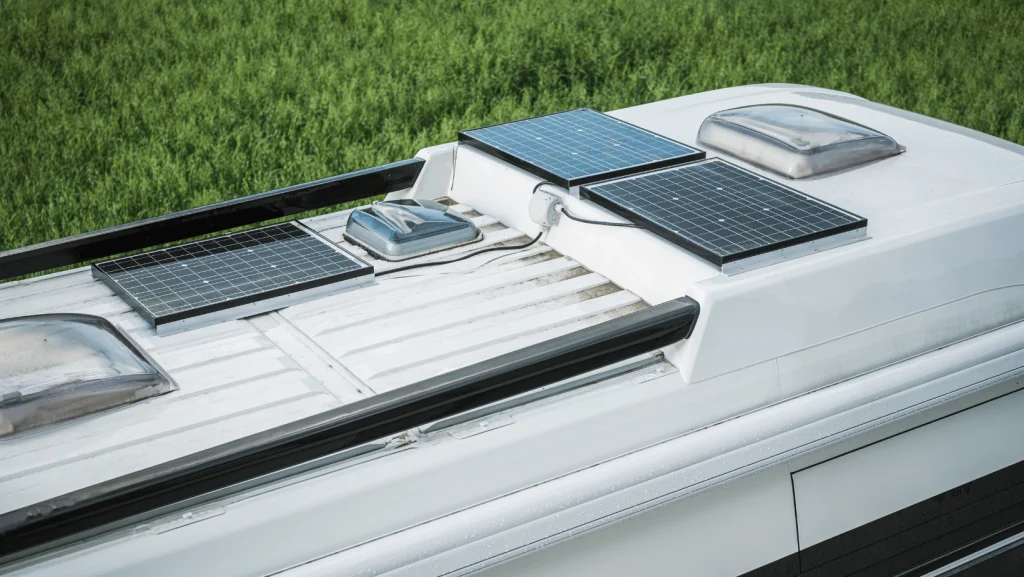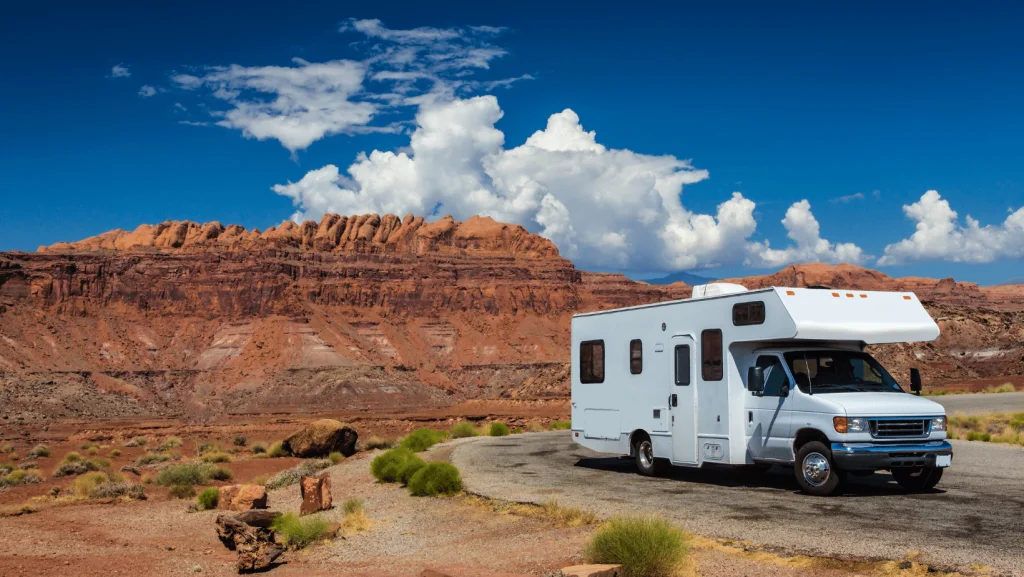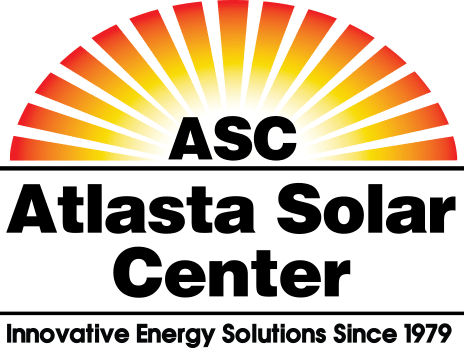Your RV takes you on plenty of adventures, all while providing the comforts of home. To accomplish and maintain modern creature comforts such as hot water, climate control, lights, etc., you know that RVs require a lot of power. You may already use a generator, but are finding that you want a sustainable, and quiet, source to power up your RV. Plus, you want to be able camp anywhere, without the constraint of relying on a power hookup. The answer: solar panels!
So, “just how much solar power do I need for my RV,” you may ask.
At Atlasta Solar, we install solar panels on RVs of all models and sizes, taking into account each RV’s power requirements and available roof space. Whether you’re a seasoned RV owner, or are considering owning an RV in the future, if you want to optimize the functionality of an RV, consider solar panels. In this blog, we look at RV solar panels and how much solar power your RV will need.

RV Power Basics
Before we jump right in explaining solar panels and the benefits of RV solar panels, it’s essential to understand how RVs are powered. Generally speaking, RVs use batteries that power appliances and lights, but these batteries won’t last long. An external power source, such as a generator, or power hookup at a campsite, is required to keep providing power for the RV’s features.
Downsides of Traditional RV Power Sources
The downsides of using an external power source are additional costs, such as propane for conventional generators, and availability. For example, if you camp off grid or “boondock,” (where no electricity is available), then your RV will rely solely on its battery bank for power. Given that RV batteries will remain charged for only so long, you will be limited with what appliances you can use, and your excursion may be cut short. Solar panels, however, can resolve these issues.
What Are RV Solar Panels?
In simple terms, solar panels convert sunlight into energy that is used as electricity. Instead of a home solar panel set up powering your home, RV solar panels are just that: solar panels that charge RV batteries.
Why Solar Panels for RVs
RV solar panels have several benefits. For one, with RV solar panels you can further explore with your RV, by camping off grid, or anywhere, without fear of your batteries losing charge. Another huge plus is lack of noise, unlike noisy generators, as solar panels quietly generate power. And of course, solar panels are great example of clean, renewable energy that eliminates the need for generators and hookups. By investing in RV solar panels, you will save on the cost of electrical hookups, as well as propane.

How Much Solar Power Does My RV Need? What to Consider
Here are the factors you need to consider for how much solar power your RV actually needs:
Power Consumption
A solar panel group is called an array size. To determine the array (how many panels), or how much solar power your RV needs, you need to know two pieces of key information: energy used versus energy stored.
Energy Used
Energy used is how much power your RV uses, or requires daily. Specifically, you need to know the total of amp hours your RV’s batteries produce. For example, most RV campers utilize about 20 kilowatt hours of electricity per day. You also need to factor in the amount and types of electrical appliances in the RV. A simple rule is the more appliances you have, the more energy required. The key is to ensure there is enough solar power to produce equal to or greater than the use.
Energy Stored
Energy stored is the amount of energy your solar panels provide to your batteries. This is important as solar panels without enough batteries to store the energy they produce result in wasted energy costs, and not providing the power the RV requires. On the other hand, having several batteries and just one solar panel will result in the batteries not being powered fully. For an optimal system, energy used and energy stored must be balanced. Knowing the amount of watts an RV uses daily determines the array size.
If you are unsure how to calculate all this, no problem! We at Atlasta Solar are here to help. We use a Load Calculation worksheet to determine how much of a battery bank is needed, to size an array. On this sheet, we list every appliance within an RV and how much power each appliance uses, to determine the average of daily watt hours.
Roof Size
The type of RV you own is also a determining factor. At Atlasta Solar, we install on all models and sizes, but it is important to know that the amount of usable roof space can limit the amount of solar that an RV can have. Does your RV have no usable roof space? Not to worry. There are several options for installing solar panels, such as a portable kit, which is just as it sounds. These kits consist of a portable solar panel that you can set up just about anywhere.
Batteries
With RV solar panels, it’s a good idea to get additional battery banks, to store more power. RV batteries usually are available in two types, lead and lithium. Lead battery banks are the most commonly used for RVs as they are cheap and durable. However, lead batteries require more maintenance and usually last for about five years. Lithium battery banks, by contrast, are far more longer lasting, efficient, and store more energy. As a result, lithium batteries are far pricier. So which battery bank to use? Think of how often, and where, you use your RV. For example, if you boondock frequently, then a lithium battery bank may be the better choice as these last longer and hold more energy. If you use your RV infrequently, then lead batteries may be preferable.
RV Solar Panels: Revitalize the RV Experience
Tired of camping in overcrowded, noisy RV campsites? Want to travel and camp in quiet, remote areas? Solar panels provide your RV the freedom to do so. With a solar powered RV you no longer have to plan your trips strictly around RV campsites and hookups – now your RV can go explore those off the beaten track destinations. Sleep without the hum of a generator and soak in the surroundings of the great outdoors. By using the energy of the sun, your RV can now take you wherever you want to go.
